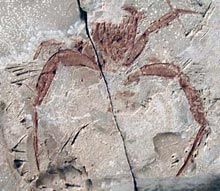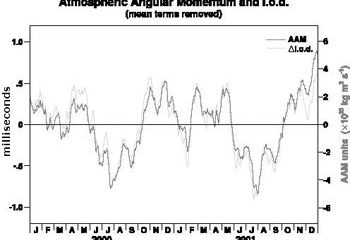Earth Sciences
Earth Sciences (also referred to as Geosciences), which deals with basic issues surrounding our planet, plays a vital role in the area of energy and raw materials supply.
Earth Sciences comprises subjects such as geology, geography, geological informatics, paleontology, mineralogy, petrography, crystallography, geophysics, geodesy, glaciology, cartography, photogrammetry, meteorology and seismology, early-warning systems, earthquake research and polar research.

Dinosaur, crab fossils reveal ecosystem secrets
For centuries, they wouldn’t be caught dead next to each other.
But now a team of geologists directed by Joshua Smith, Ph.D., assistant professor of earth and planetary sciences at Washington University in St. Louis, have found a well-preserved fossil of a crab within inches of a tail vertebra from a massive plant-eating dinosaur.
This well-preserved fossil of a crab was found within inches of a dinosaur tail in Egypt’s Bahariya Oasis, the first evidence in literature of t

Changes in jet stream, storm tracks, linked to prairie drought patterns, study finds
New findings from Queen’s researchers will help experts better predict future drought patterns and water availability in the prairies.
An international research team including biologists Kathleen Laird and Brian Cumming from the Queen’s Paleoecological Environmental Assessment and Research Laboratory (PEARL), and Peter Leavitt from the University of Regina, investigated records of drought over the past 2000 years from lake sediments in the northern Canadian prairie region (Manitoba

U. of Colorado researchers propose answer to basic atmospheric chemistry question
Scientists from the University of Colorado at Boulder have proposed a long-sought answer to how atmospheric sulfate aerosols are formed in the stratosphere.
Conducted by researchers at the Cooperative Institute for Research in Environmental Sciences, or CIRES, the research shows how a fundamental molecular process driven by sunlight may play a significant role in determining the planet’s energy budget.
The research was a collaboration between Veronica Vaida, chair of the CU-B

Changes In The Earth’s Rotation Are In The Wind
Because of Earth’s dynamic climate, winds and atmospheric pressure systems experience constant change. These fluctuations may affect how our planet rotates on its axis, according to NASA-funded research that used wind and satellite data.
NASA’s Earth Science Enterprise (ESE) mission is to understand the Earth system and its response to natural and human-induced changes for better prediction of climate, weather and natural hazards, such as atmospheric changes or El Nino events that

Wind’s energy transfer to ocean quantified for first time
Breakthrough could help resolve serious problems in oceanography and climate research
Scientists at Johns Hopkins University and the University of California-Irvine have finally been able to field-test theories about how wind transfers energy to ocean waves, a topic of debate since the 19th century that had previously proved impossible to settle experimentally.
The new results may help lead the way to the resolution of a longstanding problem in scientists’ understanding

New activity on old fault lines: French earthquake no surprise
The relatively powerful earthquake that hit eastern France last Saturday confirms the findings of the postgraduate research currently being conducted by Gideon Lopes Cardozo at the Université Louis Pasteur in Strasbourg and the Faculty of Earth and Life Sciences at the VU Amsterdam. Lopes Cardozo is investigating the causes of earthquakes in the southern part of the Rhine Graben. His research is sponsored by the European Union and has shown that the movements in the earth’s crust in the area around t